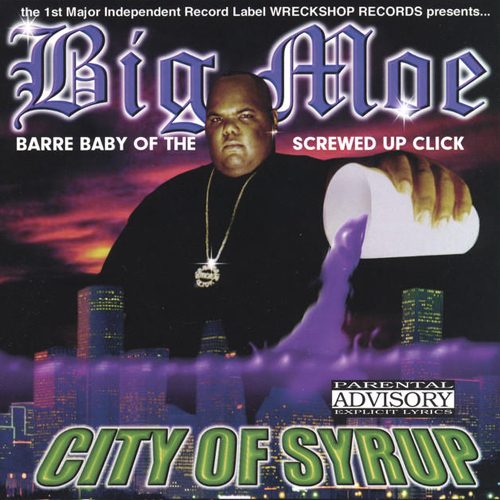As DJ Screw and his roundtable of rappers (eventually known as the Screwed Up Click) continuously expanded beyond Houston’s Southside with the legendary Screw tapes, there were occasional forays into the recording industry, some even under the supervision of Screw himself. As the 1990s drew to a close, a number of Screwed Up Click representers attempted to parlay local mixtape notoriety into regional rap star fame. Leading the way was key member Fat Pat, who didn’t live to see his 1998 solo “Ghetto Dreams” released.
While other longtime or one-time S.U.C. affiliates such as Al-D, 3-2, Big Mello, Botany Boyz, E.S.G., Lil’ Keke or Z-Ro had already put out records, 1999 and 2000 were the years Big Pokey, Big Moe, Lil’ Flip, H.A.W.K., Lil’ O, Dat Boy Grace, Wood, Yungstar, D-Gotti and Pimp Tyte all released their debuts, as if in tribute to Pat’s untimely death shortly prior. Unfortunately the rest of the rap world only really began to take notice of the movement when Robert Davis passed away on November 16th 2000.
When Big Moe released “City of Syrup” in the summer of 2000, DJ Screw was still alive, and while he makes only the briefest of appearances, Big Moe’s debut is representative of the music these guys were influenced by and the music they set out to make for themselves. Zapp, The Time and Prince all provide inspiration, but also recent hits end up in the mix. Although the “Maria Maria” reworking of “Payin’ Dues” fares better than the Dirty Third’s answer to Black Rob’s “Whoa,” “Maan!!” which despite boisterous performances from Big Moe, E.S.G. and Big Pokey doesn’t quite hit as hard as the wave of A-Town crunk that swept the country in the years to follow.
With a host of fellow Soldiers United 4 Cash joining him throughout the album, it is not always easy to make out Big Moe when he’s rapping, but that’s also because he’s very comfortable singing, a trademark that he naturally carried over from the tapes. At a time when regional rap still regularly relied on crooners to harmonize hooks, Big Moe was able to vocally shape his songs to a substantial degree, which makes “City of Syrup” a Big Moe album no matter the number of guests. Z-Ro may go first on the title track, but once Moe enters with the celebratory “All I wanna do / is bang Screw” echoed by a talkbox and followed by a sung verse, “City of Syrup” is unmistakably his. Young Z-Ro undoubtedly took notes while working with Big Moe, as evidenced by his later work.
And so Big Moe effectively transfers his mixtape M.O. to the album, ending “Choppaz” with a presumably freestyled singing performance, or turning Lisa Lisa & Cult Jam’s “I Wonder If I Take You Home” from a relationship-starting into a relationship-ending theme on “I Wonder.” In short, Big Moe is a versatile singer (and considering he also raps an even more versatile vocalist), the main reason “City of Syrup” stands out to this day. You’ll rarely hear a more coherent and convincing introduction to an artist than “Barre Baby,” where Moe hauls his droopy singing voice across a slow paced lullaby and through a lane of choir kids. The track instantly endears you to Big Moe, and while the album doesn’t soar to such theatralic heights again, it pretty much holds the note of affirmative, pacified rap music. “Get Back” is a rider tune fueled by ’80s funk, Big Moe laying down different vocal tracks accompanied by Lil’ O’s slick talk and H.A.W.K.’s philosophical flow. Local flavor is delivered in expectedly mellow fashion, from “Po’ it Up” to “Ridin’ Candy.”
On the whole, musically and conceptually, “City of Syrup” tends towards conventional (right down to its clear sound). That is, above all, a good thing. For example, all vocalists stay on topic. When they dedicate a song to a soulmate (“I’ll Do It”), they don’t run off the track but instead come as close to a marriage proposal as possible. There are also pensive moments that would do the father figure of the Screw era – Tupac Shakur – proud (“X (Time) 4 Change” and “Whatcha Want?”). Despite being heavily drenched in ‘drank’, “City of Syrup” makes sense in ways mainstream rap, or what was popular around that time, did not always. If there’s one gripe on the vocal side it’s that Big Moe could easily hold his own weight with fewer guests, given the surprisingly strong lyrical performance he gives particularly in the sung parts. And of course there’s the issue of translating the mixtape mystique to a regular speed album. The “June 27” freestyle inluded at the end and especially the closing Jodeci reinterpretation “Leanin'” capture some of that Screwston magic with fervent “I can’t leave drank alone” assertions and extended shout-outs, last but not least to fallen soldiers. Sadly seven years later Big Moe fell victim to the unhealthy diet that give him so much pleasure and us arguably hours of delightful music.

